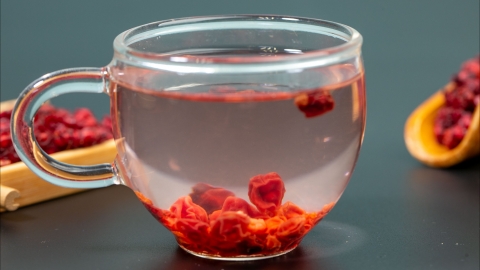Can Schisandra berries be steeped in water and consumed long-term?
Generally, it is not recommended to consume Schisandra berries steeped in water for a prolonged period. The detailed explanation is as follows:

Schisandra has effects of astringency and anti-diarrheal action, enhancing qi and promoting body fluid production, nourishing the kidneys, and calming the mind. Short-term and moderate consumption can help regulate chronic cough due to lung deficiency, deficiency of both qi and yin, and spermatorrhea due to kidney deficiency. However, the acidic components of Schisandra may irritate the gastrointestinal tract, increasing gastric acid secretion and potentially causing discomforts such as stomach pain and acid reflux, especially in individuals with weak gastrointestinal function. Due to its astringent nature, long-term consumption might cause pathogenic factors to linger in the body. For example, during the early stages of a cold or in cases of excess heat or damp-heat in the body, it may worsen the condition.
As Schisandra is warm in nature, long-term consumption may lead to internal heat accumulation, causing symptoms such as dry mouth and throat, swollen gums, and other signs of excessive internal heat. Schisandra contains lignan compounds, which may place a certain burden on the liver at high doses; long-term and excessive consumption could affect liver function. Schisandra also has certain blood pressure-lowering and sedative effects; prolonged consumption may lead to hypotension or excessive sedation, particularly in individuals already taking antihypertensive medications or sedatives.
When consuming Schisandra steeped in water, one should also avoid consuming it with spicy, raw and cold, or irritating foods. Pregnant women, nursing mothers, individuals with initial stages of cough or rashes, those with yin deficiency and excessive internal heat, and individuals experiencing fever due to a cold should avoid consumption. It is advisable to consult a qualified traditional Chinese medicine practitioner or physician before deciding on long-term usage to ensure safety and suitability.







